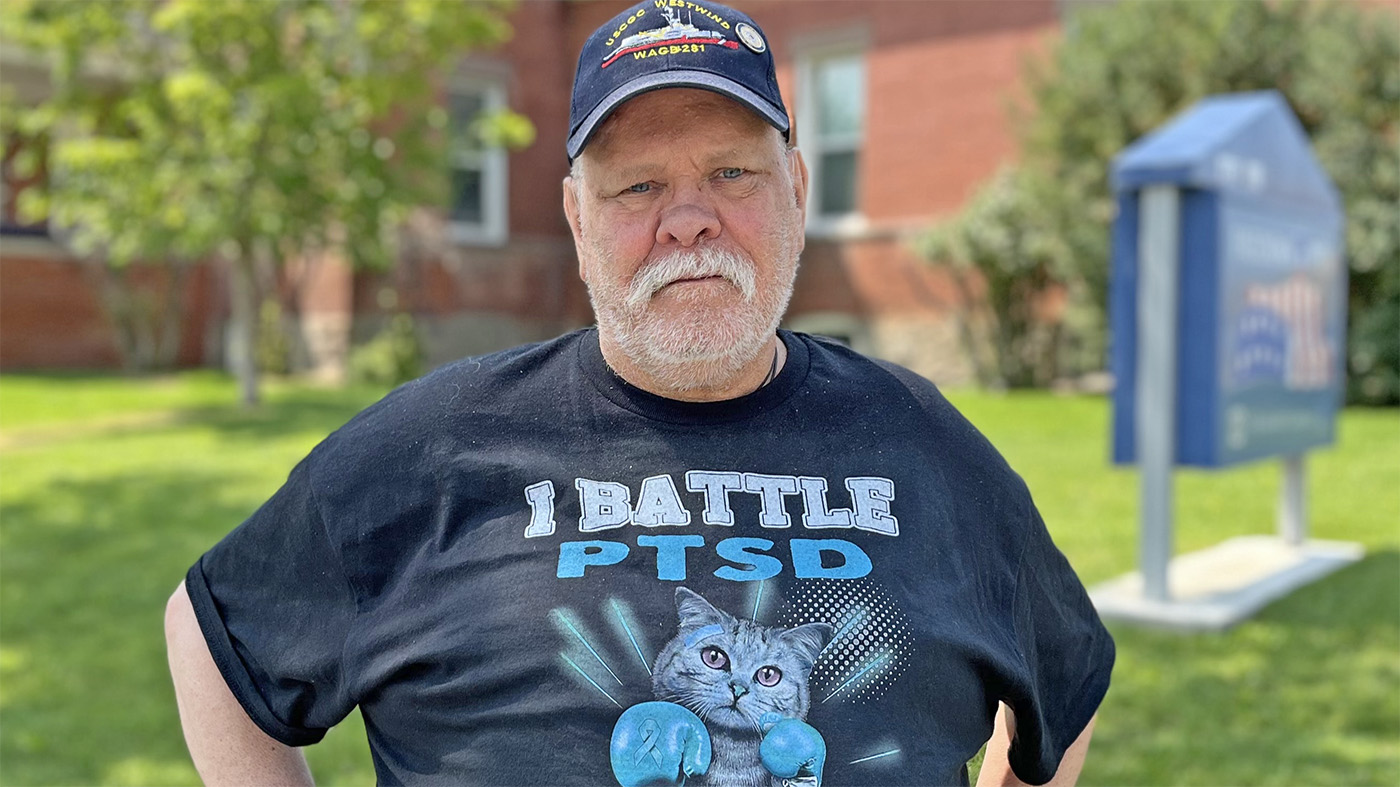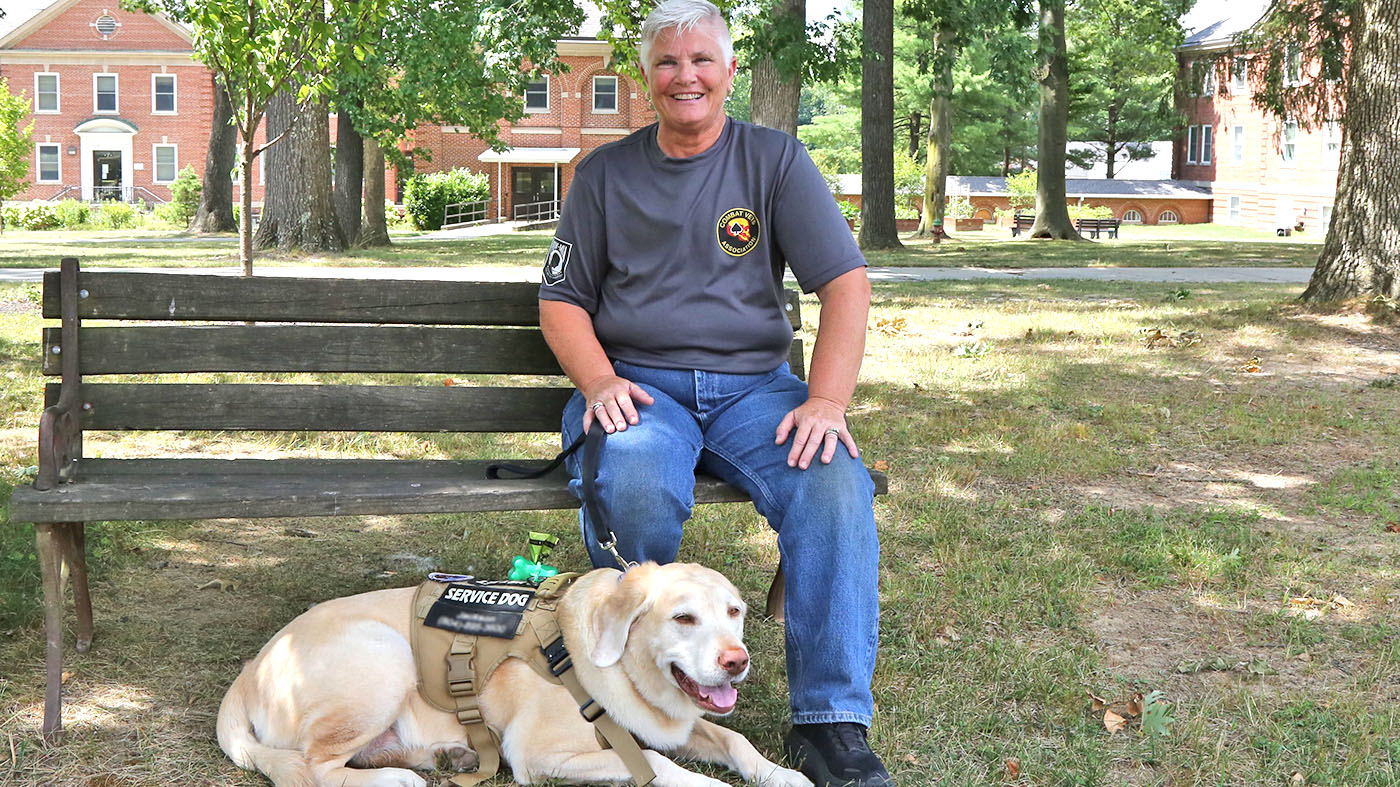Coast Guard Veteran Grady Kendall shows how VA’s Housing First approach changes the lives of Veterans experiencing homelessness. He demonstrates this impact every day because it changed his life for the better when life knocked him down.
Kendall enlisted in the Coast Guard in 1981, serving on the Coast Guard Cutter Westwind, an icebreaker vessel, until 1984. He earned the rank of seaman before transitioning back to the civilian world in 1986.
In 1984, during a Deep Freeze expedition in the Weddell Sea, the vessel suffered hull damage after slamming into an ice shelf. Its crew patched a tear before arranging complete repairs in South America.
“We got caught in ice off the Antarctic coast during a mission. I was over the side with a fire hose clearing ice away from the rudder. It was terrifying. You’re surrounded by ice. With the size of the tear, we didn’t know if we’d make it out,” Kendall shared.
Dealing with PTSD
In 2019, Kendall (pictured above) was dealing with untreated posttraumatic stress disorder (PTSD), depression, anxiety and the pressure of caring for an ailing parent. “I reached a critical point in my life. I was alone. My mom’s health was declining. I thought my only way out was suicide,” he said.
Instead of suicide, Kendall chose to reach out to his Montana VA mental health team and started treatment, which included counseling and medication.
“I finally told them about everything I had going on. I didn’t hide it anymore. I finally started advocating for myself. The counseling sessions gave me tools to manage my anxiety, and the medication helped stabilize my mood,” he said.
Losing his home
A couple of years later, in 2021, after his mother was placed in assisted living, Kendall’s family members evicted him from the place he called home due to financial disputes.
“I was suddenly homeless and had nowhere to go. This period was tough on me mentally. I was drowning with no way out,” he said.
Kendall once again turned to Montana VA, this time with help from the Department of Housing and Urban Development-VA Supportive Housing (HUD-VASH) program and Volunteers of America, who also played pivotal roles in helping him.
“Volunteers of America put me in a hotel for about eight months while I was homeless. Then, VA got me into Freedom’s Path, [which is] housing for at-risk Veterans. VA helped furnish the apartment and helped me apply for and get Supplemental Nutrition Assistance Program (SNAP) benefits to help with food,” Kendall said.
With his housing secure, Kendall was able to keep his VA health care appointments, meet with mental health care providers, manage his medications and connect with resources to file a claim for increased disability compensation.
“Once I got into Freedom’s Path, I became proactive, researching what I needed to do to find my own place. Having a roof over my head allowed me to set goals and plan for my future, like taking care of my mental and physical health, getting my VA benefits increased and securing a VA home loan,” he said.
A new beginning
Less than three years after losing his house, Kendall purchased his first home in 2024.
“I’m proud of how far I’ve come. I couldn’t have done it alone. I cannot express enough how thankful I am to VA and Volunteers of America and, of course, the great people along my journey for the help offered to me,” he said. “I feel like a phoenix rising from the ashes of a past life to this new one. Having this space of my own has allowed me to reconnect with my daughter and grandson. They can come over now whenever they want and there is no chaos. No one threatening to kick them out. I sleep very well in my new place.”
VA’s Housing First approach
VA’s Housing First approach is based on the principle that, by providing a secure place to live first, Veterans can focus on addressing other challenges, such as mental health, employment and social connections. VA’s Housing First approach has helped reduce Veteran homelessness by over 50% since 2010.
VA’s specialized programs for homeless Veterans serve hundreds of thousands of homeless and at-risk Veterans each year. Independently and in collaboration with federal and community partners, VA programs provide Veterans with housing solutions, employment opportunities, health care, justice- and reentry-related services and more.
Learn more about these programs at VA’s Programs for At-Risk Veterans and Their Families page.
Advice for fellow Veterans
The Coast Guard Veteran has a positive message of hope for his fellow Veterans who are facing similar challenges.
“Be honest with and advocate for yourself. Use the resources available to you. The doctors and nurses, your case manager and the folks at VA want what’s best for you. You don’t have to go at it alone,” Kendall added.
Veterans struggling with PTSD can begin by contacting their local VA or exploring the resources offered at the National Center for PTSD.
If you are a Veteran who is homeless or at risk of homelessness, contact the National Call Center for Homeless Veterans at (877) 4AID-VET (877-424-3838) for help.
Topics in this story
More Stories
Combat Veteran faces the traumatic events of her PTSD during prolonged exposure therapy and looks forward to the days to come.
Bob Jesse Award celebrates the achievements of a VA employee and a team or department that exemplifies innovative practices within VA.
The Medical Foster Home program offers Veterans an alternative to nursing homes.







Glad to hear of another Phoenix making it. I served 81-84 on the Cutter Duane. April 12 1982 there was a rogue wave that hit the starboard side of the boat as I had opened a man door. This through the door open and me approximately 12 feet across the deck into a vent stack. My back has been messed up ever since. I complained about the pain but was given Nsaids. So I took to drinking for comfort. This lead me down the path to early discharge. Honorable with RE-4. Over the years I had bouts of anxiety and but continued to drink and was never able to hold a job for very long. I finally quit drinking after I was diagnosed with grade 2 Spondylolisthesis an and was able to get medications to help with pain management. I have been continuously denied benefits since 2019 when I was urged to file a claim.
In 2014 I had an accident that landed me in prison for 8 yrs. After which I lost everything I owned including my home. While I was incarcerated, I started my claim. Met with one of the so called doctors, and was denied stating that “it is less than 50% likely that this accident was the cause of this condition”. I am on my final appeal and waiting for the hearing. I am getting Chiropractic services on a monthly basis, but even the doctor won’t touch the area of my condition. I am on Medi-Cal and have no income other than SNAP. I was assisted by the Roads Home program to secure a furnished apartment through HUD-VASH program which I currently live. I believe I may suffer from some depression and in need mental health.
I am attending college with the help of the Phoenix Project (county funded) which are funding my books and supplies. Great staff. I go to the Veterans Resource Center at Delta College which employs a counselor and willing to assist any veteran or dependent staff. Harmeet helped me with enrolling in my classes, Dianne always greeting, helpful and sending out emails, Kyle is always willing and able to do anything possible to get you the resources needed. Always a welcoming smile and a cup of coffee. My Vet. Rec. therapist got me connected with Freedom Rows at DSC so that I could get some no impact exercise once a week. It is a great program for veterans with disabilities. We have the largest team of adaptive rowers west of the Mississippi. I volunteer there one or two days a week, but would be more if I had transportation
Thank you for being a beacon upon my path and I will be seeking mental health care. Keep up the good work and Semper Paratus forever!!
Donald B
Special Thanks to:
Roads Home Program
HUD-VASH
SJ Housing Authority
Victory Gardens
Delta Sculling Center
Veterans Resource Center @ SJ Delta College Stockton, CA
Phoenix Project @ SJ Delta College Stockton, CA
And numerous people who have supported me along the way:
James; Phillip; Pat and Bob; Tony; Lee; Jane; Monica; Karina; Bev; Mike and Annie;
the team at DSC; Jamie; James; Phil; Eddie and Jake; and my little sister Amanda
This is a great article, and gives much needed information for all and every veteran.
Glad to hear you are surviving and advancing.
I served only 4 years in the Coast Guard doing search and rescue 1963-1967 active.
I also was diagnosed with chronic severe PTSD just about 4 years ago.
I went most of my life not knowing what was wrong with me neither did the civilian doctors. Just almost by accident in 2019 I found out I was qualified for VA health care. Then by another coincidence I became friends with an Army officer and he recognized all the classic symptoms of ptsd I exhibited.
I have been slowly going up hill sort of since then filing claims for things I should have claimed years ago but knew nothing about such things.
So hang in there and see your county vso for help.
Semper paratus ??